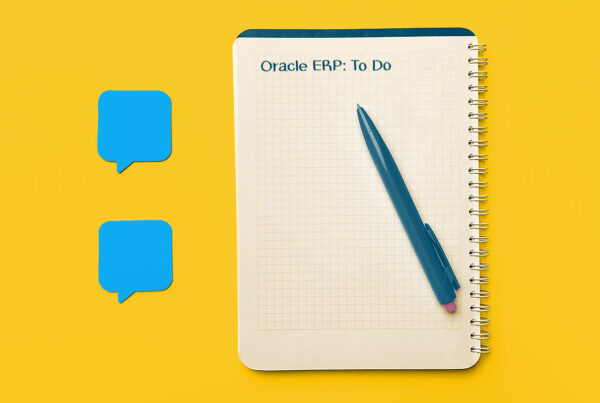For IT managers and directors handling complex operations in manufacturing, supply chain management, and other enterprises, leveraging technology is critical to driving efficiency — and success. If your company relies on Oracle applications — whether on-prem Oracle EBS or Fusion Cloud applications — you’re likely aware of the need for tailored software solutions to fit your operations.
That’s where the Oracle APEX low-code platform comes in. APEX is a tool that can reshape your operational landscape. Designed for IT leaders like you, this post sheds light on how Oracle APEX’s low-code capabilities can help enhance ERP, SCM, EPM, and HCM operations, aligning with the complexities of modern business operations.
In this post, we’ll help you better understand how Oracle APEX can seamlessly extend and customize your existing Oracle applications to better suit your unique business needs. So, without further ado, let’s explore how this tool can bring efficiency and customization to your Oracle technology stack in a language that speaks to your corporate priorities.
1. Synergy with ERP
Oracle APEX can significantly enhance the capabilities of ERP systems by enabling companies to create tailored applications that seamlessly integrate with their existing ERP infrastructure. Here are a few examples of how Oracle APEX can provide value in this context:
- Custom Dashboards for Real-time Financial Insights: With Oracle APEX, companies can develop interactive dashboards that pull data from various ERP modules. These dashboards can display key financial metrics, such as revenue, expenses, and profitability, in real time. This empowers decision-makers to quickly assess the financial health of the organization and make informed strategic choices.
- Streamlined Procurement Workflows: The Oracle APEX low-code platform can be used to build user-friendly procurement applications that streamline the procurement process. From requisition to purchase order generation and approval workflows, these applications can automate and simplify complex procurement tasks, reducing manual errors and processing times.
- Employee Self-Service Portals for HR and Payroll: Using Oracle APEX, HR teams can create self-service portals where employees can access their payroll information, request time off, and update personal details. This reduces administrative overhead and empowers employees to manage their own HR-related tasks efficiently.
Oracle APEX in Action:
Gift Processing Application
Traust utilized Oracle APEX to help a major public university foundation replace a severely outdated version of Oracle Forms to manage their donor gifts and pledges. The new application streamlines the data entry process, reducing the opportunity for data entry errors, and even fully automates some donation types.
Read More
2. Enhancing SCM
Oracle APEX can extend the capabilities of SCM systems by providing custom interfaces and applications that cater to specific supply chain needs. Here are ways the Oracle APEX low-code platform can be used to add value to SCM operations:
- Order Tracking and Visibility Tools: Oracle APEX applications can provide real-time tracking and visibility into order status, shipment locations, and estimated delivery times. This enhances transparency and customer satisfaction by keeping stakeholders informed throughout the supply chain journey.
- Inventory Management Interfaces: Companies can build intuitive inventory management interfaces that allow employees to easily manage stock levels, track inventory movements, and generate reports. This ensures optimal inventory levels, reduces carrying costs, and prevents stockouts.
- Supplier Collaboration Portals: Oracle APEX can facilitate supplier collaboration by creating portals where suppliers can update their product availability, respond to requests for quotes, and communicate effectively with the procurement team. This fosters better supplier relationships and smoother procurement processes.
Oracle APEX in Action:
Clinical Trial Supply Management Application
Traust created full lifecycle clinical trial and supply chain logistics management application using the Oracle APEX low-code platform. The 20-month project provides full material and project management functionality, fully replacing numerous manual and spreadsheet-based processes in this highly-regulated industry — including electronic document approvals and audit history.
Read More
3. Optimizing EPM
Oracle APEX can enhance EPM systems by enabling the creation of sophisticated applications that streamline performance monitoring and reporting. Here are ways Oracle APEX can add value to EPM:
- Interactive Financial Planning and Forecasting Applications: Oracle APEX allows finance teams to build custom applications for budgeting, financial planning, and forecasting. These applications can provide interactive interfaces for entering data, running scenarios, and generating financial reports, leading to more accurate and agile financial planning.
- Performance Scorecards and KPI Monitoring: With Oracle APEX, companies can develop dynamic scorecards that display key performance indicators (KPIs) across different departments. This provides a centralized view of performance metrics and facilitates data-driven decision-making.
- Consolidated Reporting Dashboards: Oracle APEX can aggregate data from various EPM modules to create consolidated reporting dashboards. These dashboards can provide executive-level insights into financial performance, operational efficiency, and goal achievement.
Oracle APEX in Action:
Construction Project Forecasting Tool
Traust helped a one of the largest construction firms in the U.S. build a proof-of-concept APEX application for forecasting project-level financials to help the company make more accurate operation decisions. The app allows users to edit monthly forecast values at both task and expenditure group levels, triggering complex calculations and providing data for analysis across multiple contract types.
4. Empowering HCM
Oracle APEX can enhance HCM systems by enabling the creation of self-service portals, performance evaluation tools, and training tracking applications. Here’s how Oracle APEX can add value to HCM:
- Employee Onboarding and Self-Service Portals: Oracle APEX allows HR departments to build onboarding portals where new employees can complete paperwork, access orientation materials, and get acquainted with company policies. Additionally, self-service portals can empower employees to manage personal information, benefits enrollment, and leave requests.
- Performance Evaluation and Feedback Systems: Companies can create custom performance evaluation applications that facilitate ongoing feedback and goal-setting between employees and managers. This promotes a culture of continuous improvement and aligns individual goals with organizational objectives.
- Training and Skill Development Tracking Applications: The Oracle APEX low-code platform can be utilized to develop applications that track employee training and skill development. This ensures compliance with training requirements, identifies skill gaps, and supports career development initiatives.
Oracle APEX in Action:
Self-Service Customer Portal
Traust recently worked with a manufacturer of metalworking tools to upgrade the company’s customer portal. The new portal — built on the Oracle APEX low-code platform — provides customers with easy access to all their order history, technical drawings, and specifications for the tools the company has manufactured for them. Customers can quickly review their tooling and reorder as needed. The portal also includes order tracking information to keep customers informed on the status of their orders.
Read More
By effectively utilizing Oracle APEX in these use cases — and many more — companies can enhance their existing Oracle ERP, SCM, EPM, and HCM systems, unlocking greater efficiency, agility, and data-driven decision-making.
Extending Your Oracle Ecosystem with the Oracle APEX Low-Code Platform
Oracle APEX empowers your team to break barriers, tackle project backlogs, and extract maximum value from your Oracle applications. As cloud migration becomes a core strategy, Oracle APEX shines at delivering practical functionality, business intelligence, and reporting for your business users. Moreover, as agility and adaptability increasingly become the cornerstones of success, Oracle APEX emerges as a powerful tool that empowers businesses to rapidly develop and deploy customized applications without compromising on quality or functionality.
For more than two decades, Traust has been at the forefront of providing expert Oracle consulting and services to businesses seeking to leverage cutting-edge solutions for streamlined operations. With a deep understanding of the intricate interplay between Oracle ERP, SCM, EPM, and HCM systems, we recognize the pivotal role that these integrated systems play in modern enterprises. Today, we are excited to help guide companies further extend and enhance their existing Oracle ecosystems using the Oracle APEX low-code platform.
Interested in learning more about how Oracle APEX can help extend the functionality of your Oracle applications? Let’s connect.





